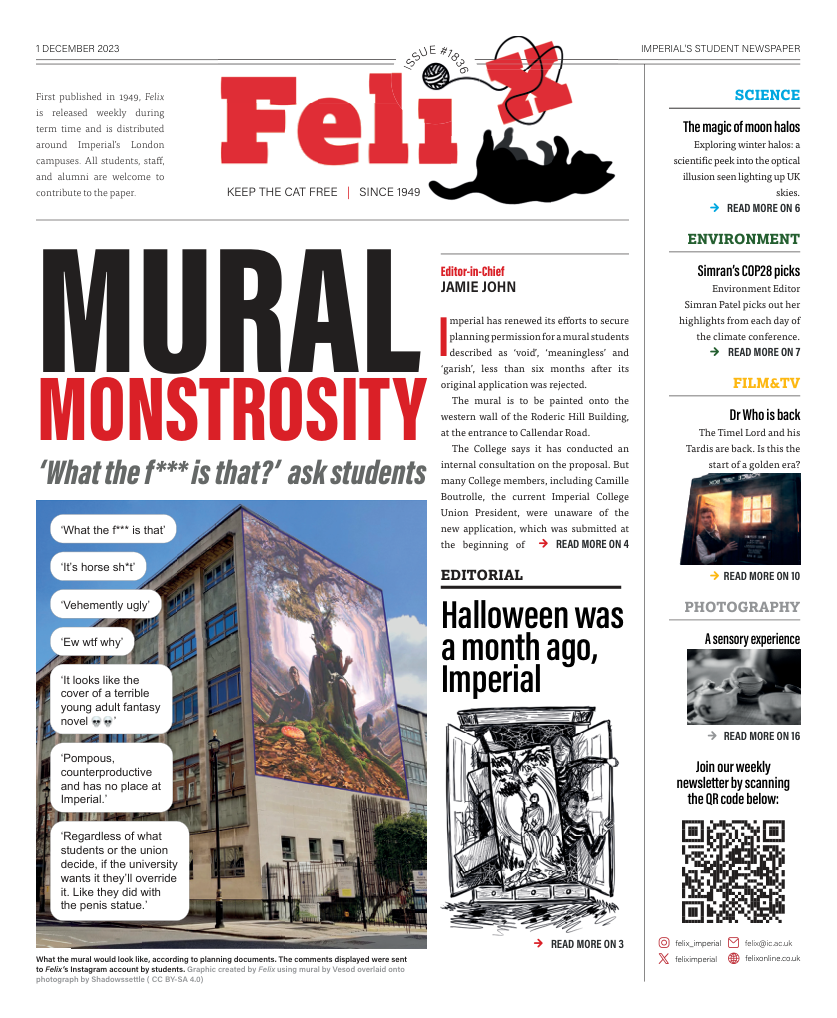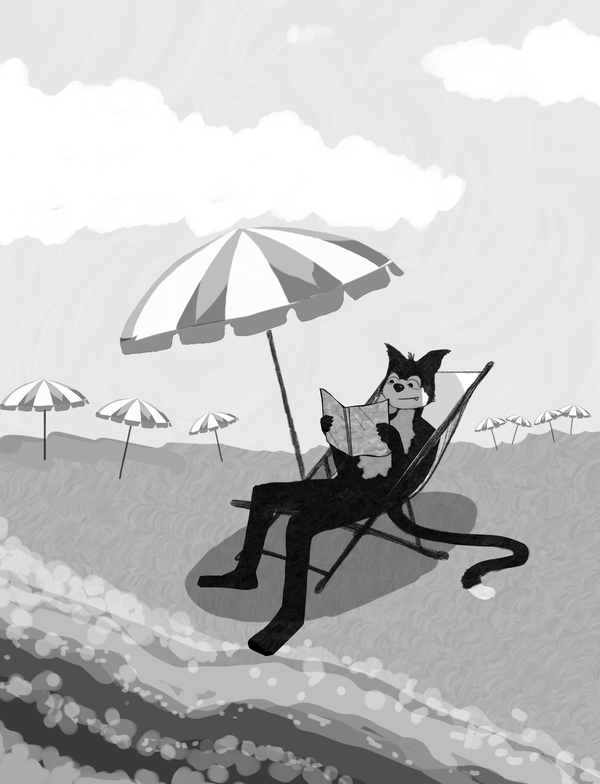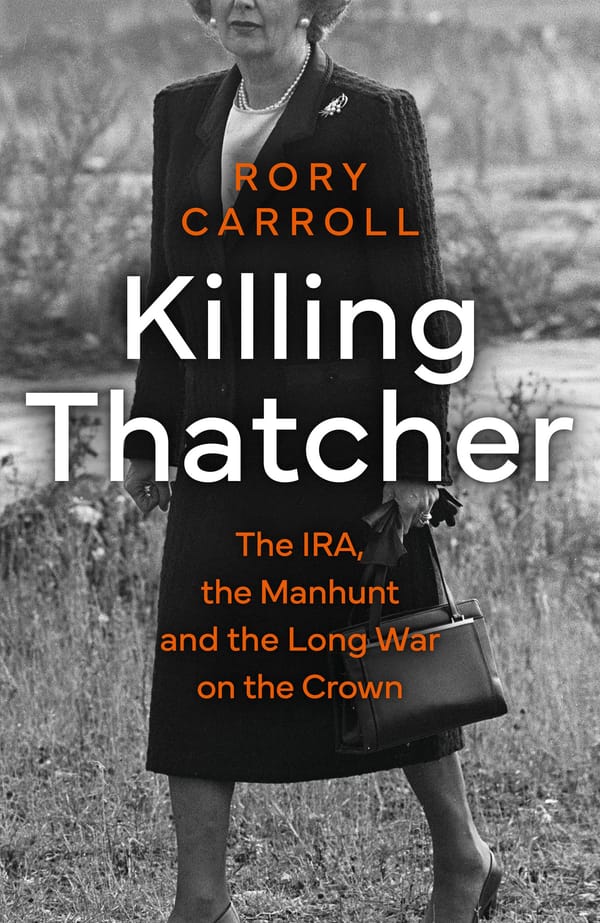The scents in killing
Katia Zykova provides a chemical and literary perspective on the acclaimed story of a murderer.

Perfume is the morbid tale of a serial killer, who murders young girls to extract their scent. In essence, more reptile than human, Grenouille, the ghoulish centre of Patrick Süskind’s Perfume cares not so much for people’s souls, but their scents.
Born in the most pungent sh market of eighteenth-century Paris and yet somehow himself odourless, he possesses an extraordinary sense of smell; with this, he seeks to create a perfume that, when worn, will help him escape his pain of neglect. For Grenouille, the world is not just a palette of colours witnessed, but an olfactory map to be plundered by the nostrils.
“Brass,” Süskind writes, “porcelain and leather, grain and gravel”, these are the items that can only be detected by “the best nose in Paris”. But Grenouille himself knows that ordinary scents are unable to accomplish his exhalted goal, and yet he is consumed by its pursuit. Looking at things from today’s perseptive, why?
The ghoulish centre of Patrick Suskind's Perfume cares not so much for people's souls, but their scents.
The art of perfumery
There are two techniques of perfumery that are described in this novel: distillation and enfleurage.
Behind the doors of the laboratory of the character Baldini, Grenouille’s first instructor in this sensory art, is found an alembic in full operation. Its revelation is on par with a magician pulling off a trick.
The alembic heats substances in order to extract the valuable compounds of a mixture. The vapours of the volatile compounds rise and condense into a separate ask. With its ties to alchemy, distillation was, at the time, viewed as a process filled with mystique.
The framing of the scene is crucial, from literary and chemical perspectives. The image of two perfumers slowly watching the generation of a golden liquid signifies the cutting-edge nature of this technology in the era, a symbol of its intrigue.
Distillation has a long history interwoven with tradition and culture. The first alembic has traces back to 4000 BC Mesopotamia. Its invention is not only important in the history of perfumery, but wine and beermaking as well.
Thus, the unorthodox approach that Grenouille takes to mix perfumes – without care or use of measurement – heavily diminishes the importance assigned to the craft by Baldini.
These are embodiments of modernity placed against tradition. Süskind incorporates these themes to acknowledge how he himself breaks tradition in the publication of his controversial novel. The reader encounters outrageous ideas presented in Perfume. Their notions on the conventions of literature are challenged. By breaking out of the shelter of tradition held up by Baldini, the reader is taken to the French town of Grasse (the world capital of perfume-making) and is introduced to the technique of enfleurage.
The reader is forced to open their minds in outrageous ways to the ideas presented in Perfume.
Fragile flowers
From enfleurer (‘to saturate with the perfume of flowers’), enfleurage can be broken into two types: hot and cold.
It is a necessary distinction. In hot enfleurage, also known as maceration, flowers are placed in oil (a blend of ¾ fat from beef, and ¼ from pork), heated within the range of 40–60°C and regularly stirred. The oil is then filtered and washed with alcohol, in order to obtain a scented infusion.
Cold enfleurage, conversely, is used on fragile flowers and plants that cannot withstand the high temperatures of maceration. It involves the layering of flowers in animal fat on a wooden chassis, left for much longer than flowers in hot enfleurage. The flowers are removed by hand and the fat is washed away with alcohol; what remains is the essence absolute - a concentrate of a flower’s scent.
Enfleurage, both hot and cold, was a labour-intensive and an expensive process. It is this unrelenting dedication that contributes to the eerie note that playing throughout Perfume. One played above its base chord of absurd horror, as Grenouille chooses cold enfleurage method to extract the human scent.
In the novel, Süskind’s implicit reference to the girls murdered as “fragile flowers” and the arduous elements of this process contribute overwhelmingly to the interpretation of Perfume as an allegory to Armageddon. Indeed, Grenouille’s disturbing physical qualities, paired with his slatternly mother, characterise him an Antichrist figure. His actions in pursuit of exhalted perfumery exhibit the exact qualities expected in an Antichrist: a drive to replace God on Earth. The contrast between the beauty of the girls and the vileness of their murder indicates an explicit hatred of humanity – not just a simple love of murder.
Love in the ether
The limitations of these old-fashioned techniques were a source of literal pain for Grenouille – as upon discovering that he is unable to capture such wonderful scents as the “odour of glass, the clayey, cool odour of smooth glass,” or that of “brass, porcelain and leather, grain and gravel,” he almost died.
Another question to ask is can a scent induce love in us?
So although Grenouille hunts after what to us seems like a rather odd assortment of items, the juxtaposition of the bloody, cold odour of brass to the warm, fragrant scent of leather and grain follow a preference for symbols of duality by Süskind.
We are reminded that Grenouille is both a collector, and a boy seeking love. Although he yearns to preserve every scent – it is those scents that will garner him the love that he centres on the most. Hence this jump from glass, brass, and porcelain to more familiar scents such as leather and grain.
Why did the boy Grenouille, want love? Or another question that can be asked is can a scent induce love in us?
Humans have about 400 active odorant receptors, each expressed on the cell membrane of the olfactory sensory neurons that communicate with certain regions of the brain. These include the amygdala and prefrontal cortex (PFC), both closely related to emotion and emotion-related learning. Scents are associated with a reward value, just as food is. (The body asks us, in turn, should we stay away or come closer?)
A remarkable creation of Grenouille’s follows his arrival at Grasse: a perfume to mimic the human scent. From this seed, he is able to create various perfumes, all human, but capable of invoking shifts in the attitudes of the people around him. “He changed [them] like clothes,” Süskind writes, “as the situation demanded and which permitted him to move undisturbed in the world of men and to keep his true nature from them.”
Thus, Grenouille is able to draw others close and push them away, through scent.
The heart note
However, he remains unsatisified. He begins to believe that what he was born for – his ultimate purpose was to create a scent so powerful it could command the masses through love.
Out of this, the core theme of Perfume arises: a universal desire set in each person to fulfil some task or accomplish a goal that they believe they were born for. Grenouille believed he was born “to create a scent that was not merely human, but superhuman, an angel’s scent.”
He becomes convinced that love was something automatically assigned to us when we are born. Rejected by every maternal figure and so overcome by his pride he does not see the same happening to others. Incorrectly he draws the conclusion that he has been cheated out some form of inheritance.
The soul note
Perfume is a magnificent horror story about a boy attracted to scents, but Süskind writes a novel that feels more akin to an allegory to Armageddon, with Grenouille as its Antichrist – hated by all who set their noses on him.
In our society today, there are Grenouilles who exist: the people who attempt to compel the respect of the population they cater to. Politicians who seek to mask their corruption with pretty speeches. Companies hiding their inhumane production methods. They, like Grenouille, mask their evil with a perfume. But Perfume when it comes down to it was never about capturing scent, it was about capturing human love. And, for Grenouille, this will sadly never be possible. A note of melancholy lingers in the air.









